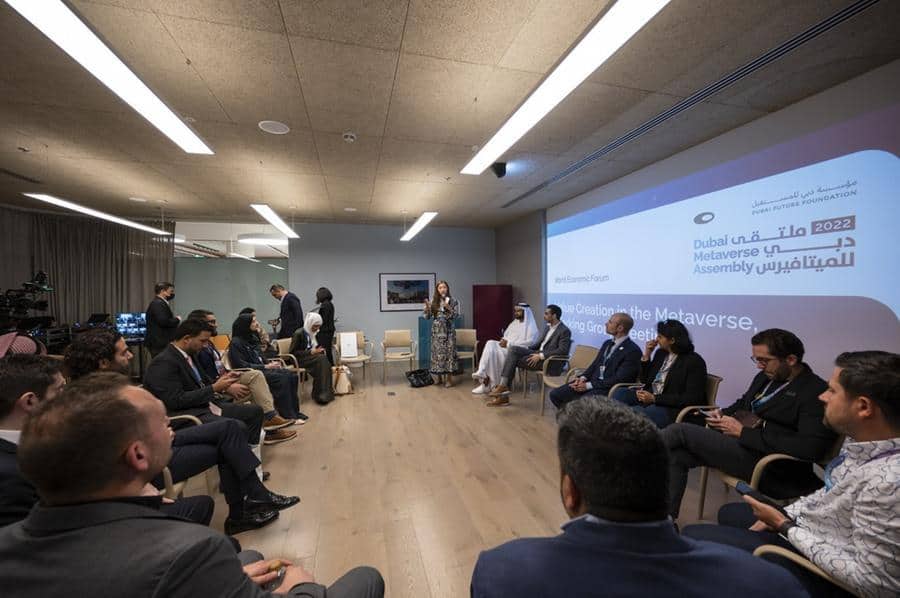Dubai, UAE — By 2030, the global metaverse market is expected to touch $1.6 trillion, and Dubai is keen to partake of the boom in technology and innovation.
The emirate has taken several steps to integrate the metaverse into the UAE’s economy and society.
Dubai’s Virtual Assets Regulatory Authority established its Metaverse headquarters in May, becoming the first regulator to do so. Then it unveiled the Dubai Metaverse Strategy in July, aiming to create 40,000 virtual jobs and add $4 billion to the emirate’s economy over the next five years.
“UAE has consistently shown its ability to identify global trends and position itself as a leader in different domains,” says Nikita Sachdev, CEO of Luna Consultancy and fintech advisor.
“With the Global Metaverse Market expected to be worth $1.6 trillion by 2030, Dubai Metaverse Strategy is yet another example of the country’s foundational ability to keep up with, and even lead, technological innovations,” she added.

Dubai’s Strategy can have a massive impact on the local economy. It aims to attract more than 1,000 companies in the blockchain and metaverse fields.
With the move of new companies comes an influx of investment capital, job vacancies, and product and service offerings on the market.
More so, the Strategy aims to surpass the physical borders of the country’s economic expansion by creating 40,000 virtual jobs and captivating the attention of consumers from all over the world.
Plus, the creation of Gross Metaverse Product is a great indicator of the Strategy’s potential to bring growth to other economic sectors like tourism, education, retail, and real estate.
Major pillars of the Strategy
Extended reality (VR), augmented reality (AR), virtual reality (VR), mixed reality, and digital twins (a virtual representation of an object or system) are the key pillars of the Strategy.
It focuses on improving human thinking processes by utilizing real-time data, machine learning, IoT, AI simulation, and blockchain.
The metaverse strategy’s technology pillars are data, network, cloud, and edge computing, all of which concentrate on real-world data acquisition, validation, storage, processing, and management.
Different support points incorporate advancing the whole arrangement of 5G organizations to empower edge processing and provide on-request PC framework assets. For example, instead of sending data to the cloud, data can be collected, stored, and processed locally using smart devices and local networks.
According to Sachdev, the metaverse offers numerous potential benefits and opportunities for Dubai, including creating new forms of entertainment, enhancing the tourism industry, and driving innovation and economic growth.
“The nation has already begun incorporating AR elements into its tourism industry, such as offering virtual tours of popular landmarks and attractions.”
Moreover, Dubai is exploring the potential of the metaverse areas such as education, healthcare, and retail. For example, the city has announced plans to use VR technology to enhance student’s learning experience and provide training for healthcare professionals.
In the retail sector, Dubai is looking to use the metaverse to create virtual shopping experiences that allow customers to browse and purchase products online in a virtual environment.
People and companies’ interactions
The metaverse has made it possible for people to connect and engage with each other like never before.
According to Sachdev, people’s interactions with the metaverse in the UAE may vary depending on their interests and how they interact with the virtual world.
Some people may use the metaverse for entertainment, such as playing video games or participating in virtual events and activities.
Others may use the metaverse to socialize, attend virtual meetings or conferences, collaborate on projects, or network with friends. However, the most significant opportunity, in her opinion, is the boundless inclusiveness, equality, and educational support it can provide globally.
Companies also may benefit from entering the metaverse in various ways, including increased reach, better customer service, and cost savings by eliminating the need for a physical location.
The most appealing advantage, however, is a new revenue stream. Nike is an excellent example of how businesses can profit from virtual experiences.
Metaverse’s future in 2023
Leading brands and companies have been interested in the virtual world in 2022. Metaverse technologies have the potential to assist companies in capturing digital representations of physical channels, such as products and operations, to enhance physical processes.
As a result, the metaverse is now poised to impact every aspect of business, including how work is done, what products are offered, how products are distributed, and how businesses run.
Sachdev believes the metaverse will continue to evolve and expand over the next few years and become an increasingly important part of our daily lives.
“Mass adoption of the metaverse is inevitable, “she said. “We are already seeing an increase in virtual experiences, such as concerts, events, and business activities in the metaverse. We have witnessed the incredible growth of the metaverse in 2022, with new creative ideas and concepts captivating the attention of the whole world. However, it’s important to remember that massive growth will come from tech solutions that can serve onboard millions of users without jeopardizing the quality of the experience. So, the best is yet to come.”








